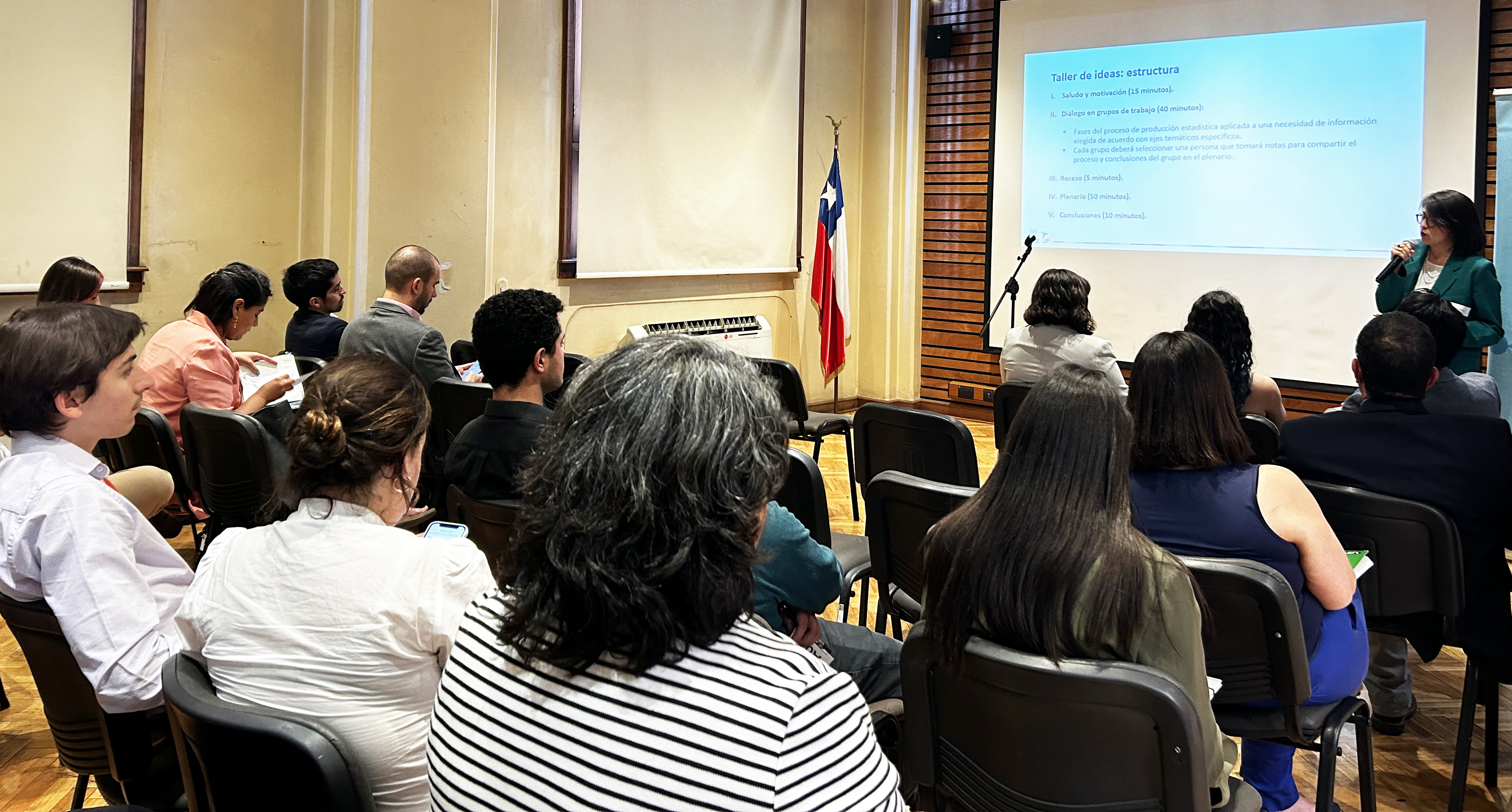ECLAC contributes to strengthening the capacities of the Ministry of Finance of Chile on gender statistics and indicators
Work area(s)
Topic(s)
The Economic Commission for Latin America and the Caribbean (ECLAC) conducted a training on gender statistics and indicators for the Ministry of Finance of Chile and its dependent and related institutions. This training was carried out in the context of the technical assistance that the Division for Gender Affairs, in coordination with the Economic Development Division of ECLAC, conducts for that institution. The training was attended by 70 staff members and consisted of four virtual sessions and an in-person ideas workshop held between November and December 2023.

The main objective of the training was to contribute to strengthening the capacities of data professionals, analysts, and advisors, to promote the use and analysis of gender statistics and indicators which contribute to incorporating the gender perspective in the daily work of each team.
During the virtual sessions, ECLAC's Division for Gender Affairs provided information to participants on the conceptual framework of gender statistics and indicators in Latin America and the Caribbean, including the autonomy of women and the structural constraints of gender inequality, gender mainstreaming in the statistical process, the dissemination and communication of data and information, among other issues related to the work of the Ministry of Finance. Among these issues, it was highlighted that at the XV Regional Conference on Women in Latin America and the Caribbean (hereinafter, "XV Conference"), ECLAC Member States established a series of agreements on fiscal matters in the Buenos Aires Commitment (BC). These agreements, together with a set of covenants of the Commitment in other areas, propose a path to move towards a care society. The contents of the training were also contextualised by using examples of the work of the Ministry and its related services, to which the staff members responded with an enthusiastic participation.
More specifically, in relation to the conceptual framework, the contents of valuable tools were shared, such as the Guidelines for mainstreaming the gender perspective in statistical production, which is currently in its editorial process (its presentation in Spanish and summary are available). In addition, the document developed by ECLAC and presented at the XV Conference entitled "Breaking the statistical silence to achieve gender equality by 2030" was shared as well. For her part, Karen García, Statistician of the Division for Gender Affairs, presented key indicators in the region in terms of economic, physical and decision-making autonomy, according to the official information that is reported and processed by the Gender Equality Observatory of Latin America and the Caribbean of ECLAC. At the same time, the Officer presented ECLAC's proposal to move towards the paradigm of a care society that puts the care and sustainability of life at the centre, highlighting the importance of measuring the use of time to achieve this transition.
Regarding the agreements on fiscal issues reached in the Buenos Aires Commitment, Diego Collado, Associate Economic Affairs Officer of the Division for Gender Affairs, highlighted that these include matters such as the design, implementation and evaluation of fiscal policies (income, spending and investment) from a gender equality approach, with a view to increasing investment in care policies and infrastructures (see paragraph 26 of the BC). Member States should also allocate budgets with a gender perspective, implement gender-responsive countercyclical fiscal policies, and promote progressive fiscal policies (see paragraphs 27 and 28 of the BC). The commitments also included strengthening regional cooperation to combat tax evasion and avoidance and illicit financial flows (see paragraph 29 of the BC). Finally, he pointed out that Member States committed to ensuring that fiscal adjustments are in line with human rights and non-discrimination principles, avoiding increases in poverty rates among women and their burden of unpaid and care work (see paragraph 31 of the BC).
In the in-person workshop, professionals from the Division for Gender Affairs, together with Ramón Pineda, Coordinator of the Employment Studies Unit of ECLAC's Economic Development Division, presented examples of gender indicators that could be developed using information from the Ministry of Finance, its dependent and related services, and other sources of information from the State in areas related to gender and fiscal policy, the labour market and trade. Next, the participants applied their knowledge in a group exercise, in which proposals for statistical production were made, following the guidelines on gender perspective throughout the eight phases of the process of production of official statistics, and based on three themes associated with the work of the Ministry: employment, user satisfaction, and financial and/or tax education.
In the satisfaction survey carried out within the context of the training, 72.4% of the participants said they "Strongly agree" with the statement "It is important to have training instances in the field of gender statistics and indicators". In addition, 90% stated that they would recommend the training among their colleagues. As indicated in the Guidelines for mainstreaming the gender perspective in statistical production, training for public officials is an enabler for the generation of information that contributes to guiding action, in an effective manner, towards gender equality.
More information:
Information note from the Ministry of Finance of Chile: https://www.hacienda.cl/noticias-y-eventos/noticias/cepal-imparte-capacitacion-en-estadisticas-e-indicadores-de-genero-en-el
